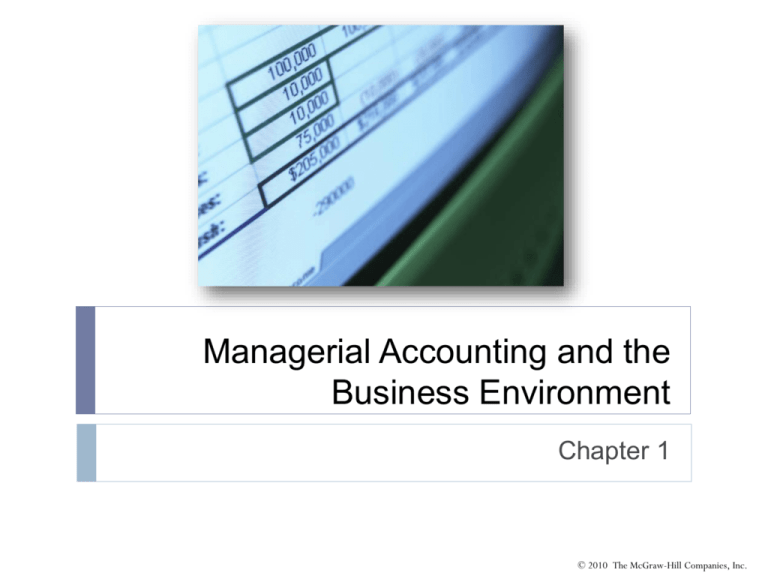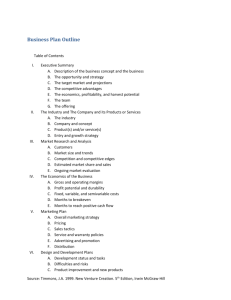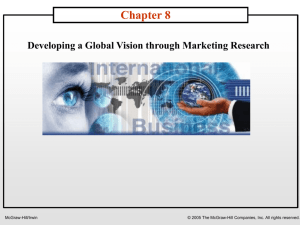GNB Chapter 1
advertisement

Managerial Accounting and the Business Environment Chapter 1 © 2010 The McGraw-Hill Companies, Inc. Strategy A strategy is a “game plan” that enables a company to attract customers by distinguishing itself from competitors. The focal point of a company’s strategy should be its target customers. McGraw-Hill/Irwin Slide 2 2012 Game Plan !! McGraw-Hill/Irwin Slide 3 Customer Value Propositions Customer Intimacy Strategy McGraw-Hill/Irwin Understand and respond to individual customer needs. Slide 4 Customer Value Propositions Operational Excellence Strategy McGraw-Hill/Irwin Deliver products and services faster, more conveniently, and at lower prices. Slide 5 Customer Value Propositions Product Leadership Strategy McGraw-Hill/Irwin Offer higher quality products. Slide 6 Organizational Structure Decentralization is the delegation of decisionmaking authority throughout an organization. Corporate Organization Chart Board of Directors President Purchasing Personnel Vice President Operations Chief Financial Officer Treasurer McGraw-Hill/Irwin Controller Slide 7 Line and Staff Relationships Line positions are directly related to achievement of the basic objectives of an organization. Example: Production supervisors in a manufacturing plant. McGraw-Hill/Irwin Slide 8 Line and Staff Relationships Staff positions support and assist line positions. Example: Cost accountants in the manufacturing plant. McGraw-Hill/Irwin Slide 9 The Chief Financial Officer (CFO) A member of the top management team responsible for: Providing timely and relevant data to support planning and control activities. Preparing financial statements for external users. McGraw-Hill/Irwin Slide 10 Code of Conduct for Management Accountants The Institute of Management Accountant’s (IMA) Statement of Ethical Professional Practice consists of two parts that offer guidelines for: Ethical behavior. Resolution for an ethical conflict. McGraw-Hill/Irwin Slide 11 IMA Guidelines for Ethical Behavior Recognize and communicate professional limitations that preclude responsible judgment. Maintain professional competence. Competence Follow applicable laws, regulations and standards. Provide accurate, clear, concise, and timely decision support information. McGraw-Hill/Irwin Slide 12 IMA Guidelines for Ethical Behavior Do not disclose confidential information unless legally obligated to do so. Do not use confidential information for unethical or illegal advantage. Confidentiality Ensure that subordinates do not disclose confidential information. McGraw-Hill/Irwin Slide 13 IMA Guidelines for Ethical Behavior Mitigate conflicts of interest and advise others of potential conflicts. Refrain from conduct that would prejudice carrying out duties ethically. Integrity Abstain from activities that might discredit the profession. McGraw-Hill/Irwin Slide 14 IMA Guidelines for Ethical Behavior Communicate information fairly and objectively. Credibility Disclose delays or deficiencies in information timeliness, processing, or internal controls. Disclose all relevant information that could influence a user’s understanding of reports and recommendations. McGraw-Hill/Irwin Slide 15 IMA Guidelines for Resolution of an Ethical Conflict Follow employer’s established policies. For an unresolved ethical conflict: Discuss the conflict with immediate supervisor or next highest uninvolved manager. If immediate supervisor is the CEO, consider the board of directors or the audit committee. Contact with levels above the immediate supervisor should only be initiated with the supervisor’s knowledge, assuming the supervisor is not involved. McGraw-Hill/Irwin Slide 16 IMA Guidelines for Resolution of an Ethical Conflict Follow employer’s established policies. For an unresolved ethical conflict: Except where legally prescribed, maintain confidentiality. Clarify issues in a confidential discussion with an objective advisor. Consult an attorney as to legal obligations. http://dsc.discovery.com/videos/american-chopper-great-dispute/ McGraw-Hill/Irwin Slide 17 Why Have Ethical Standards? Ethical standards in business are essential for a smooth functioning economy. Without ethical standards in business, the economy, and all of us who depend on it for jobs, goods, and services, would suffer. Abandoning ethical standards in business would lead to a lower quality of life with less desirable goods and services at higher prices. McGraw-Hill/Irwin Slide 18 Company Codes of Conduct Broad-based statements of a company’s responsibilities to: Employees Customers Suppliers And to the communities in which the company operates. McGraw-Hill/Irwin Slide 19 Corporate Governance The system by which a company is directed and controlled. Board of Directors Incentives and monitoring for Top Management To pursue objectives of Stockholders McGraw-Hill/Irwin Slide 20 The Sarbanes-Oxley Act of 2002 The Sarbanes-Oxley Act of 2002 was intended to protect the interests of those who invest in publicly traded companies by improving the reliability and accuracy of corporate financial reports and disclosures. Six key aspects of the legislation include: The Act requires both the CEO and CFO to certify in writing that their company’s financial statements and disclosures fairly represent the results of operations. The Act establishes the Public Company Accounting Oversight Board to provide additional oversight of the audit profession. The Act places the power to hire, compensate, and terminate public accounting firms in the hands of the audit committee. The Act places restrictions on audit firms, such as prohibiting public accounting firms from providing a variety of non-audit services to an audit client. McGraw-Hill/Irwin Slide 21 The Sarbanes-Oxley Act of 2002 (continued) The Act requires a public company’s independent auditor to issue an opinion on the effectiveness of the company’s internal control over financial reporting to accompany management’s assessment, and both are included in the company’s annual report. The Act establishes severe penalties for certain behaviors, such as: McGraw-Hill/Irwin • Up to 20 years in prison for altering or destroying any documents that may eventually be used in an official proceeding. • Up to 10 years in prison for retaliating against a “whistle blower.” Slide 22 Enterprise Risk Management A process used by a company to proactively identify and manage risk. Should I try to avoid the risk, share the risk, accept the risk, or reduce the risk? Once a company identifies its risks, perhaps the most common risk management tactic is to reduce risks by implementing specific controls. McGraw-Hill/Irwin Slide 23 Corporate Social Responsibility Corporate social responsibility (CSR) is a concept whereby organizations consider the needs of all stakeholders when making decisions. Customers Employees Suppliers Communities Stockholders Environmental & Human Rights Advocates CSR extends beyond legal compliance to include voluntary actions that satisfy stakeholder expectations. McGraw-Hill/Irwin Slide 24 McGraw-Hill/Irwin Slide 25 End of Chapter 1 McGraw-Hill/Irwin Slide 26




